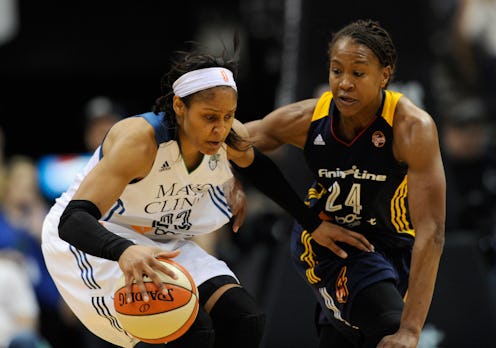Life
Are Gender Differences In Sports Just Evolution?
The idea that sports are somehow naturally men's domain is nothing new, but it is freshly exhausting every time it comes up — like, for instance, in a recent study that some are reading as evolutionary evidence that men are just more interested in sports than women. I'll pause while you go through the same fit of exasperated spluttering that I did. Because seriously: Are we never going to stop having this conversation?
The study itself looked at gender differences in motivation and interest regarding sports, reviewing previous research done on the subject over the past few decades and looking for possible evolutionary explanations as to why girls and women show less interest in sports — and different motivations for their interest — than men. What it doesn't do is claim to prove that the gender difference in sports interest is solely, or even primarily, a byproduct of evolution.
In a piece for TIME, though, these nuances are not addressed. Author Jeffrey Kluger dismisses the idea that gender roles are artificial constructs as "mostly rubbish," and plays on the idea that there are fundamental differences between male and female brains (the claim being that "boys and girls are born fundamentally, behaviorally different" — although it should be noted that researchers have studied this subject and have found that how parents treat boys and girls correlates with differences in the gendered behavior of children). He argues that differences in sports participation among children show that sports are innately male, which effectively ignores both the overt and covert forces that shape the gender consciousness of young children. And although he does note, "None of this means that socialization, gender bias and all of the other cultural variables are not at work in the largely male world of sport," evolutionary mechanisms are tasked with carrying the majority of the argument's weight.
To me, the piece reads like a highlights reel of all the reasons people give about why sports are the natural domain of men — which, of course, is precisely the attitude that reinforces the social constructs around sports that exist in the first place.
But Kluger's article, though frustrating, isn't really the problem; nor is a scientific research paper investigating potential underlying evolutionary principles around the gender imbalance in sports. Indeed, the researchers conclude that socialization is most likely not the sole cause of this imbalance, but they don't claim it's insignificant. The problem is the fact that society as a whole codes sports as fundamentally masculine and justifies this view with some vague explanation about evolution, without caring about the actual science. And that has very real impact for female sports fans and female athletes, at all levels of competition.
Saying that sports are inherently masculine is all well and good in theory, but a substantial body of research says something else. Playing sports has been shown to have numerous positive benefits for girls, from increased health to improved emotional wellbeing to better body image to greater success later in life. Beyond just the physical effects, girls derive emotional and psychological benefits from participating in sports, suggesting that playing sports is actually very natural for girls and women. And in fact, studies on why girls are so much more likely to stop playing sports in adolescence suggest it's not due to inherent lack of interest, but due to sexist forces at work in society, such as the pressure to be seen as passive, oppressive body standards that make girls feel awkward engaging in physical activity, or even the fact that many girls just aren't ever taught about sports bras.
Plus, there's plenty of science to suggest that kids don't even really take to these ideas about gender differences all that quickly anyway, suggesting that gender roles are not as "natural" as some might think.
Additionally, the idea that women don't enjoy watching sports is pretty much debunked by the fact that, well, millions of women do enjoy watching sports. Around 45 percent of all NFL fans are women according to the Washington Post, for instance — and that number might be higher if teams would be better about trying to communicate with their female fan base. And as The Atlantic notes, women consistently make up at least a third of viewers in most sports according to Nielsen figures — and often more.
And all of this is despite the facts that sports are coded as masculine, that female fans are often patronized, that sports leagues often don't take violence against women seriously, and that women's sports are underfunded and typically ignored. So imagine what things would look like if all that changed: If female athletes — at all levels, from elementary school to professional leagues — were taken just as seriously and given just as much respect as their male peers. If female fans weren't quizzed about their sports knowledge to "prove" that they're "real fans," or asked if they just think the players are cute. If women liking sports was treated as the totally normal phenomenon that it is. If all of that and more actually happened, things would likely be much different.
And that is the real issue here. It's not disputed that women are less likely to participate in sports as either players or spectators. But trying to figure out why is more difficult. Because it's not like you can take people who have never been socialized in our heavily gender-imbalanced world and run tests on them. Those people don't exist. And so trying to sort out how much of anything gender-related comes down to evolution and how much to socialization is always difficult.
But trying to act as though evolution really does mean sports are inherently masculine is not supported by existing science — no, not even studies that suggest there's an evolutionary component. And it's high time we all stopped acting like it.
Image: Giphy (3)
